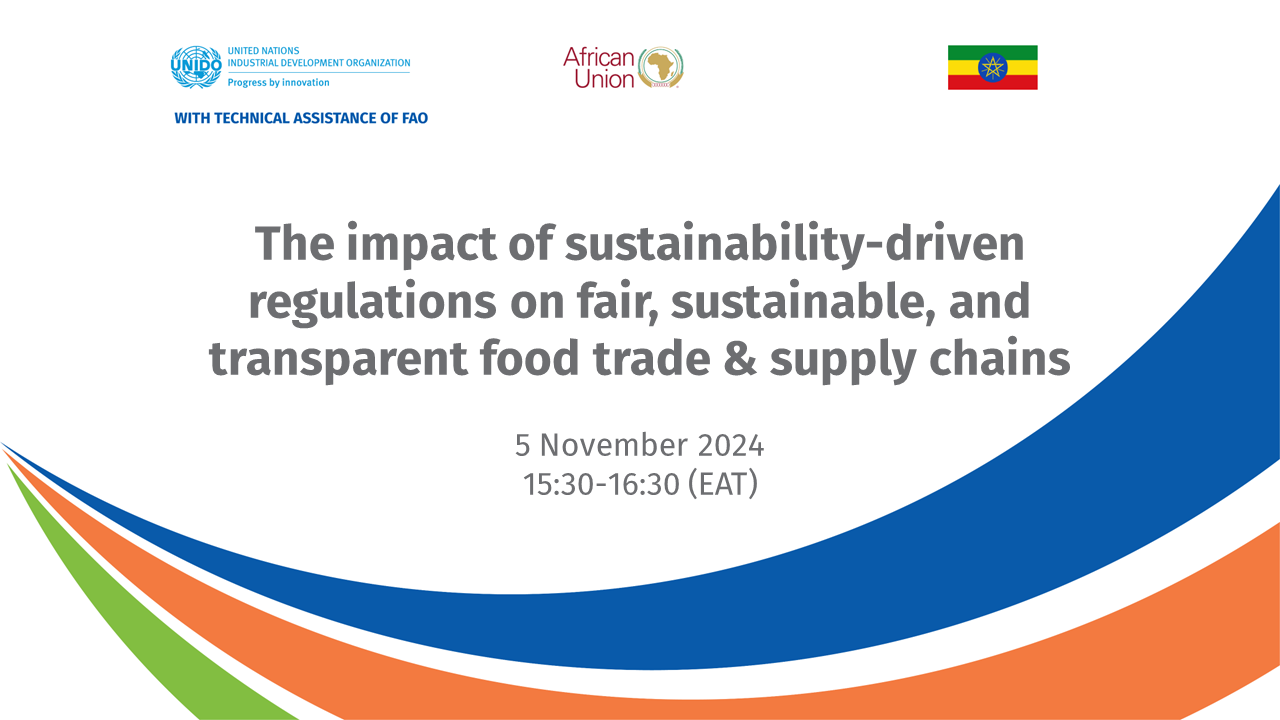


The issue:
Sustainability-driven regulations have become a new trend among industrialized countries. Focusing on the implementation of environmental and social standards, they are labelled as sustainability standards, environmental, social and governance (ESG) or simply, due diligence requirements. These regulations are a cause of concern among producer countries as they may lead to an increase in administrative and compliance requirements and, therefore, costs for small- and medium-sized enterprises (SMEs) in the agri-food sector, who are supplying larger buyers. As supply chains become more regulated, and costs of production increase, food prices may go up further, contributing to food and nutrition insecurity issues globally.
On the other hand, such sustainability-driven regulations can offer producers opportunities in the form of long-term productivity gains and higher prices thanks to more sustainable production processes and products.
To help manage the burden of increased regulatory compliance, it is essential to provide tailored technical support to industrializing countries in improving their regulatory frameworks and enforcement mechanisms in ESG and quality assurance standards. This will also help measures are unavoidable to comply with global standards set by the International Labour Organization and the Paris Agreement (among others) and those that are becoming increasingly necessary to access the markets of industrialized countries.
Local industries will also need to improve their competitiveness and productivity to address complex issues, such as fair wages and child labour. Robust vocational education systems and skills development in agri-food processing and related sectors and industries would also need to be established to foster sustainable industrialization and eradicate hunger through equitable socioeconomic access to food.
Addressing the complexity of sustainability-driven regulations and their implications on low- and middle-income countries is still possible as regulators have recognized the need for an adequate transition period.
Objectives:
This moderated discussion will:
Explore the impact of increased regulatory measures promoting environmental and social standards in the food systems of industrializing countries. Many have already expressed concerns about the new sustainability-driven supply chain regulations, which have disproportionately increased costs for agri-businesses in the producing countries.
Examining both challenges and opportunities, the session will also discuss what is required to scale positive examples across different supply chains and entrench them at a systemic level.
Key guiding questions:
What are the possible implications of sustainability-driven regulations for food security?
How could we mitigate the unintended consequences of sustainability-driven regulations for food security, from a socioeconomic access perspective, impacting the most vulnerable, particularly smallholder farmers, SMEs and consumers?
What is the role of the international development community and industrialized countries in addressing these development challenges in food supply chains?
Expected outcomes:
Creating awareness of the opportunities and potential unintended consequences of sustainability-driven regulations by highlighting recent findings on the potential impacts for smallholders and SMEs.
Identifying solutions towards a more fair distribution of the cost of compliance between the producer and consumer countries.
Session format and structure:
The moderator will introduce the topic followed by a short keynote "setting the scene” with some current data on the impact of sustainability requirements on production costs and food prices. The panellists will then provide perspectives from their respective fields of work on the challenges, opportunities and costs of sustainability-driven regulations for smallholders, SMEs, agri-food trade and the environment.
Moderator

Ms. Mary Porter Peschka, Regional Director for Eastern Africa, IFC
Mary Porter Peschka is IFC’s Regional Director for Eastern Africa based in Nairobi, Kenya. In this role, she leads the implementation of IFC’s strategy, oversees its operations across sectors, and manages key relationships with clients, partners, and governments in the sub-region. Her focus is on creating, expanding, and deepening markets in Africa that create jobs and opportunities for more people.
Mary, a United States national, joined IFC in 2004. Prior to her current role at IFC, Mary served as Director of the Sustainability & Gender Solutions Department, and Director of the Global Advisory Solutions Department. She also previously served as Regional Head of Advisory Services in Latin America & the Caribbean, and Regional Head of Sustainable Business Advisory in the Middle East & North Africa. Before joining IFC, Mary held various positions in the public and private sectors, including Market Access International, an economic development consulting firm; St. Genevieve Group, a group of international mining companies; and the U.S. Agency for International Development (USAID). Mary holds a BA from George Washington University, an MSc from the London School of Economics, and an MBA from the University of Oxford.
Panelists

Ms. Madeline Muga, Strategy and Impact Director, Fairtrade Africa
Madeline is a dynamic leader with over 20 years of expertise in strategy, impact, and organizational development across NGOs, international development, and corporate sectors. As Strategy and Impact Director at Fairtrade Africa, she has driven transformative organizational growth through strategic planning, resource mobilization, and policy influence at global levels. Known for her ability to lead complex projects, Madeline excels in fundraising, advocacy, and monitoring & evaluation. Earlier in her career, within sectors focused on humanitarian and development efforts, having worked for Caritas and Terre des Hommes.

Mr. Escipión J. Oliveira-Gómez, Director of the Division of Enterprises Competitiveness and Institutions, International Trade Centre
Mr. Oliveira-Gómez is the Director of the Division of Enterprises Competitiveness and Institutions at the International Trade Centre (ITC). He has over 30 years of experience in managing and evaluating multi-donor programmes, focusing on the competitiveness and internationalization of SMEs and the strengthening of BSOs in developing countries. His previous roles include Assistant Secretary General of the Organisation of African, Caribbean, and Pacific States, Deputy Executive Director of Caribbean Export, and Deputy Development Cooperation Minister of the Dominican Republic.

Mr. Matt Kovac, Chief Executive Officer, Food Industry Asia
Matt Kovac is the Chief Executive Officer at FIA, the food industry’s first regional industry platform for multinational, regional and local food & beverage companies. He reports to a non-profit board of regional CEOs from multinational companies, such as Unilever, Coca Cola, PepsiCo, Danone, Kellogg’s, Mars, Mondelez, McDonalds, Nestle etc.
Matt manages a team of 15 secretariat staff based in Singapore, is responsible for delivering policy outcomes in nutrition, food safety, sustainable packaging and regional trade across Asia through the establishment of multi-stakeholder platforms and capacity building projects. He is active in APEC and sits on the steering committee of the Food Safety Cooperation Forum’s PTIN, and is a member of Save The Children’s Corporate Advisory Council in Singapore, a board member of the Global Food Safety Partnership convened by the World Bank, and works with the Asian Development Bank on food safety and trade-related products in the Greater Mekong Subregion.